Blog
Treating Headaches With Traditional Chinese Medicine

Quite often we see patients who come to Above & Beyond Acupuncture who are suffering from headaches and looking for relief. Many times these patients have been suffering for long durations of time and have exhausted all other avenues for treatment. While not everyone experiences severe, debilitating headaches, almost everyone has suffered from a headache at some point in his or her life. Over the counter medications, like Tylenol or Advil, do provide some temporary relief, but those remedies treat the symptom for a short duration of time and will require the individual to keep taking more until the headache goes away. In stark contrast, Traditional Chinese Medicine is more concerned with treating the root cause of the headache while also tending to the pain. This is a more holistic approach that is geared towards providing resolution of the cause.
It is important to have a proper definition of what a headache is. The Mayo Clinic defines a headache as a pain in any region of the head. Headaches may occur on one or both sides of the head, be isolated to a certain location, radiate across the head from one point, or have a vise-like quality. Headaches may appear gradually or suddenly, and they may last less than an hour or for several days. [Link].
So how prevalent are headaches across the globe? The World Health Organization reports that among adults, incidence of current headache disorder – symptoms that have occurred at least once within the last year – is 47%. Half to three quarters of the adults aged 18–65 years in the world have had headache in the last year, and among those individuals, more than 10% have reported having a migraine. [Link]. With those statistics, it’s clear that many people have suffered (or will suffer) from headaches at some point in their adult life.
Taking over the counter drugs, like Advil or Tylenol, to provide relief from headaches can have undesirable effects on the body. Many times people will take these drugs often and beyond their recommended daily dose. WebMD states that non-steroidal anti-inflammatory drugs (including ibuprofen) may rarely increase the risk for a heart attack or stroke. They go on to state that NAISD’s may infrequently cause serious (rarely fatal) bleeding from the stomach or intestines. This effect can occur without warning at any time while taking this drug. [Link]
Traditional Chinese Medicine (TCM) takes a different approach towards treating headaches. Rather than just providing a temporary fix its efforts are focused on a lasting solution. An acupuncturist will get a detailed history from the patient that will provide clues to help identify the root cause(s). Each patient presents differently and has disharmonies (with deficiencies and/or excesses) that are specific and unique.
From a TCM perspective, there are a number of specific causes that can create the symptoms of a headache. An acupuncturist will use differential diagnosis to reveal disharmonies that can range from an external invasion of a pathogenic factor, dampness, phlegm and different types of Qi deficiencies. (Please note that there are many other diagnosis in addition to the ones listed). Once the proper diagnosis is provided, a treatment plan will be employed which can include acupuncture, Chinese herbs, nutritional guidance and lifestyle coaching. By using these holistic modalities, harmony within the body can be achieved and headaches can be eliminated.
The next time you have a headache, please consider using Traditional Chinese Medicine. It will not only help alleviate the pain, but will help provide you with a better sense of relief and wellness.









